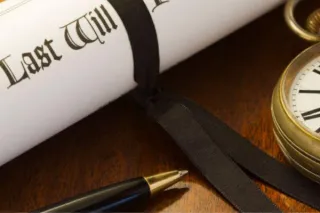About Us
Traditional Values with a Modern Approach
Welcome to RedLake, where we blend traditional values with a modern approach to provide comprehensive will writing services and support for our clients. Established in 2002, we have become the first choice for many clients because of our commitment to understanding their needs and taking care of them every step of the way.

How We Like To Do Things
From the First Meeting to Ongoing Support: A Commitment to Your Success
The First Meeting
Our first meeting is designed to establish a strong foundation of trust and understanding. We take the time to learn about your unique situation, goals, and aspirations, ensuring that our services are tailored to meet your specific needs.
Unique Solutions
Our team of experts works closely with you to develop a comprehensive estate plan, will, and lasting power of attorney that aligns with your objectives. By taking the time to understand your unique circumstances, we can create a plan that not only protects your assets but also ensures the well-being of your loved ones for years to come.
Ongoing Support
We understand that your financial situation and personal circumstances may change over time. That's why we're committed to providing ongoing support and guidance throughout our relationship. Our team is always available to answer any questions or address any concerns you may have, providing peace of mind every step of the way.

Our Expert Services
At RedLake, we are committed to offering a range of specialised services designed to help you secure your legacy and protect your loved ones. Our expertise lies in the areas of probate, estate planning, will writing, and lasting power of attorney services.
Don't wait for crisis. Act now and secure your future.
Our team at RedLake is here to guide you through every step of the process, providing expert advice and tailored solutions to meet your unique needs. Whether you're just starting to think about estate planning or need assistance with an existing plan, we're here to help you make informed decisions and achieve your goals.
FAQ
Who Can Make A Will?
Generally, individuals can create a will if they are at least 18 years old and possess testamentary capacity. While there are a few exceptions to the minimum age requirement in exceptional situations, the standard rule is that the ability to create a will – similar to the ability to own property – commences once an individual attains the age of majority, which is 18.

Can children inherit property?
In the United Kingdom, children can inherit property, which is often placed into an estate trust that they can access at a later stage in their lives.

Beneficiaries - Who can Benefit from Your Will?
In England and Wales, you enjoy near-total liberty to bequeath your estate to whomever you desire. After all, it's your property! To determine the beneficiaries of your estate, create a will and explicitly state your wishes. If you don't, the law intervenes and dictates the distribution of your assets.

Read our Latest Blog Posts
Will Writing, Lasting Power of Attorney, Probate & Estate Planning

What Is An Executor?
Understanding Executors: What You Need to Know.
When it comes to estate planning and wills, the role of an executor is crucial. Whether you find yourself appointed as an executor or are considering whom to choose for your own will, it's important to understand the responsibilities and considerations involved. In this blog post, we'll provide you with a comprehensive overview of what an executor is and address common questions surrounding this vital role.
What is an Executor?
An executor is an individual designated in a will to manage and settle the estate of the deceased person. The estate encompasses all their possessions, properties, and finances. Acting as the legal representative, the executor carries out various tasks to ensure the orderly distribution of assets and fulfilment of the deceased person's wishes.
Choosing Executors for Your Will
When creating a will, selecting the right executor(s) requires careful thought. Since the role involves significant work and responsibility, it's essential to choose someone you trust implicitly and who is willing to carry out the necessary duties. Ideally, you should discuss the responsibilities with your chosen executor(s) beforehand to ensure their willingness to fulfil the role.
Who Can Be an Executor?
Executors can be friends, family members, or individuals close to you. They don't have to be related to you, but it's important to consider their ability to handle the responsibilities associated with the role. Additionally, those chosen as executors may also be beneficiaries of your will.
Appointing Multiple Executors
To distribute the responsibility and provide a backup in case one executor is unable to fulfill their duties, it is recommended to appoint at least two executors. Having multiple executors can help ensure that the process proceeds smoothly and efficiently.
Professional Executors
In situations where you lack suitable candidates or have a complex estate, you may choose to appoint a professional executor, such as a solicitor or an accountant. Professional executors have experience in handling intricate estates and can provide valuable expertise. It's important to note that professional executors charge fees for their services, which will be deducted from your estate.
Understanding Executor Responsibilities
If you find yourself appointed as an executor, you will have various responsibilities to fulfill:
Securing the deceased person's property promptly after their passing.
Collecting all assets, including money and property, belonging to the estate.
Settling any outstanding taxes and debts using funds from the estate.
Distributing the estate's assets to the beneficiaries named in the will.
Applying for Probate
Probate is the legal process that grants the executor the authority to handle the deceased person's estate. To apply for probate, you will need to complete specific forms, including form PA1 and the relevant Inheritance Tax form. These forms, along with supporting documents, should be submitted to the local probate registry, accompanied by the appropriate fee.
Dealing with Inheritance Tax
Inheritance Tax may be applicable if the value of the estate exceeds a certain threshold. It is essential to obtain a professional valuation for significant assets like properties or investments and provide detailed information to HM Revenue and Customs (HMRC).
Distributing the Estate
Distributing the estate to the beneficiaries is one of the final steps of the executor's role. This includes honoring any specific bequests mentioned in the will and preparing estate accounts for each beneficiary. It's crucial to keep detailed records of all transactions and activities related to the estate to address any future inquiries.
Need Assistance?
Whether you've been elected as an executor or are in the process of selecting your own executors, it can be an overwhelming experience.
So if you need assistance with any or all of the above mentioned points, we're more than happy to help. Simply get in touch or schedule a consultation call with us HERE and we'll help you through the process.


